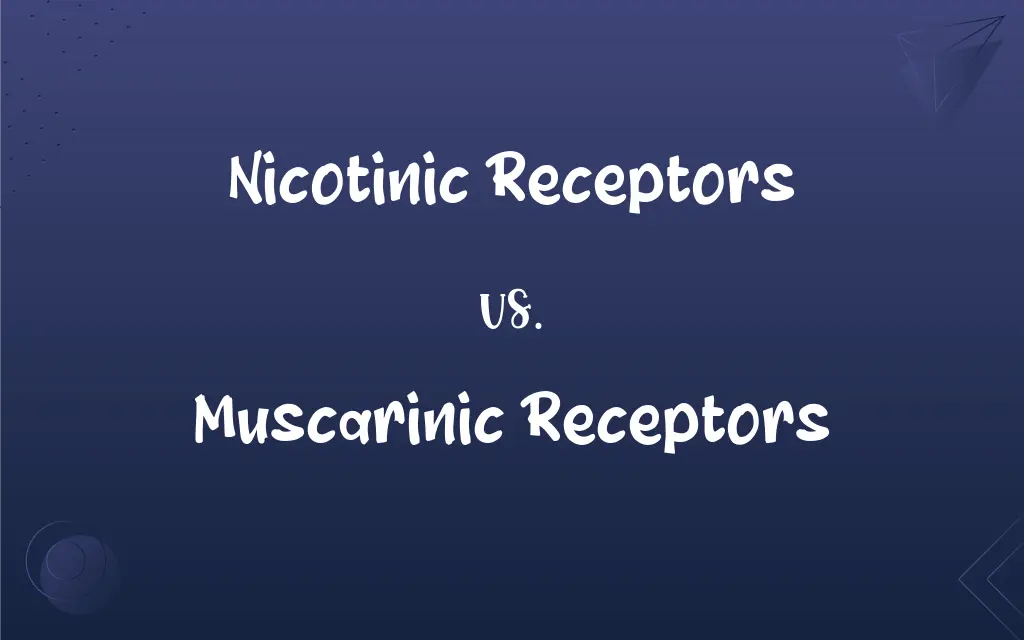Nicotinic Receptors vs. Muscarinic Receptors: What's the Difference?
Edited by Aimie Carlson || By Janet White || Published on January 28, 2024
Nicotinic receptors are ionotropic, responding quickly to neurotransmitters, while muscarinic receptors are metabotropic, causing slower, more prolonged effects.

Key Differences
Nicotinic receptors, named after their response to nicotine, are a type of acetylcholine receptor that are ionotropic, meaning they directly control ion channels. Muscarinic receptors, responding to the muscarine compound, are metabotropic and work through G-proteins, affecting cells over a longer duration.
Found in the neuromuscular junction, nicotinic receptors facilitate rapid synaptic transmission, leading to muscle contraction. Muscarinic receptors, located in various organs like the heart and lungs, modulate slower, more sustained responses like heart rate regulation.
Nicotinic receptors play a crucial role in the activation of muscles and are key in the sympathetic and parasympathetic nervous systems. Muscarinic receptors are involved in various physiological functions such as glandular secretion and smooth muscle contraction.
The activation of nicotinic receptors causes an immediate influx of ions, notably sodium and calcium, leading to depolarization. Muscarinic receptors, through G-protein coupled reactions, can either stimulate or inhibit cellular responses, depending on their subtype.
Nicotinic receptors are targets for both therapeutic agents and toxins, affecting muscle and neural function. Muscarinic receptors are involved in the action of various drugs affecting the parasympathetic system, like medications for asthma or cardiovascular diseases.
ADVERTISEMENT
Comparison Chart
Type of Receptor
Ionotropic (directly control ion channels)
Metabotropic (work through G-proteins)
Location
Neuromuscular junction, nervous system
Various organs (heart, lungs, glands)
Response Time
Rapid synaptic transmission
Slower, more prolonged effects
Role in Body
Muscle activation, sympathetic/parasympathetic
Glandular secretion, smooth muscle contraction
Effect on Cellular Activity
Causes ion influx and depolarization
Stimulates or inhibits cellular responses
ADVERTISEMENT
Nicotinic Receptors and Muscarinic Receptors Definitions
Nicotinic Receptors
Found in both the central and peripheral nervous systems.
Nicotinic receptors in the brain are involved in cognitive function.
Muscarinic Receptors
A type of receptor sensitive to acetylcholine and the compound muscarine.
Muscarinic receptors in the heart help control the heart rate.
Nicotinic Receptors
Play a key role in the activation of the sympathetic and parasympathetic nervous systems.
Nicotinic receptors help regulate heart rate and blood pressure.
Muscarinic Receptors
Can either stimulate or inhibit cellular activities.
Certain muscarinic receptors in the brain are involved in memory and learning.
Nicotinic Receptors
Ionotropic receptors that quickly transmit signals by controlling ion channels.
The activation of nicotinic receptors causes muscle contractions.
Muscarinic Receptors
Have diverse roles due to their presence in many different organs.
Muscarinic receptors in the lungs are targets for asthma medication.
Nicotinic Receptors
A type of receptor that responds to the neurotransmitter acetylcholine and nicotine.
Nicotinic receptors at the neuromuscular junction are critical for muscle movement.
Muscarinic Receptors
Involved in various physiological processes like glandular secretion.
Activation of muscarinic receptors stimulates saliva production.
Nicotinic Receptors
Targeted by various drugs and toxins affecting neuromuscular transmission.
Some pesticides inhibit nicotinic receptors, disrupting nerve signal transmission.
Muscarinic Receptors
Metabotropic receptors that affect cells over longer periods.
Muscarinic receptors modulate smooth muscle contraction in the intestines.
FAQs
How do nicotinic receptors function?
By directly controlling ion channels for rapid signal transmission.
What are muscarinic receptors?
Metabotropic receptors sensitive to acetylcholine and muscarine.
Where can muscarinic receptors be found?
In various organs including the heart, lungs, and glands.
Are nicotinic receptors involved in muscle movement?
Yes, they are crucial for muscle contraction.
What is the function of muscarinic receptors?
To modulate slower cellular responses through G-proteins.
Can nicotinic receptors affect cognitive function?
Yes, those in the brain are involved in cognitive processes.
Do muscarinic receptors affect heart rate?
Yes, they play a significant role in heart rate regulation.
Are muscarinic receptors targeted by asthma medications?
Yes, particularly those in the lungs.
Where are nicotinic receptors located?
In the neuromuscular junction and nervous system.
What are nicotinic receptors?
Ionotropic receptors responding to acetylcholine and nicotine.
How do muscarinic receptors influence glandular secretion?
They stimulate or inhibit secretion in various glands.
What is the response time of nicotinic receptors?
They transmit signals rapidly.
Do muscarinic receptors have different subtypes?
Yes, there are several subtypes with varying functions.
Is nicotine associated with nicotinic receptors?
Yes, nicotine directly activates these receptors.
Are nicotinic receptors ionotropic or metabotropic?
They are ionotropic.
Are muscarinic receptors ionotropic or metabotropic?
They are metabotropic.
Can nicotinic receptors be blocked by certain pesticides?
Yes, some pesticides inhibit these receptors.
Is muscarine related to muscarinic receptors?
Yes, muscarinic receptors are sensitive to muscarine.
Are muscarinic receptors slow in their response?
Yes, they cause slower, more prolonged effects.
Do drugs interact with nicotinic receptors?
Yes, many drugs and toxins target these receptors.
About Author
Written by
Janet WhiteJanet White has been an esteemed writer and blogger for Difference Wiki. Holding a Master's degree in Science and Medical Journalism from the prestigious Boston University, she has consistently demonstrated her expertise and passion for her field. When she's not immersed in her work, Janet relishes her time exercising, delving into a good book, and cherishing moments with friends and family.
Edited by
Aimie CarlsonAimie Carlson, holding a master's degree in English literature, is a fervent English language enthusiast. She lends her writing talents to Difference Wiki, a prominent website that specializes in comparisons, offering readers insightful analyses that both captivate and inform.































































